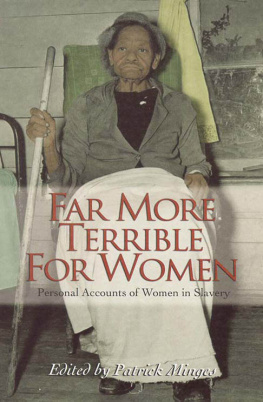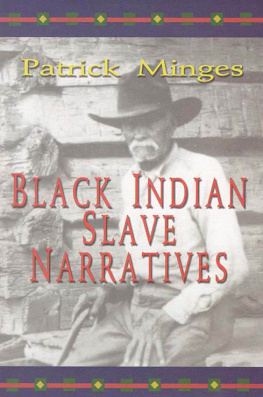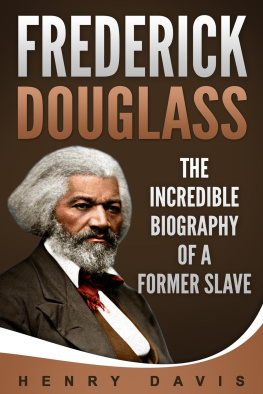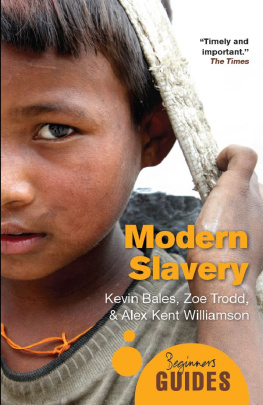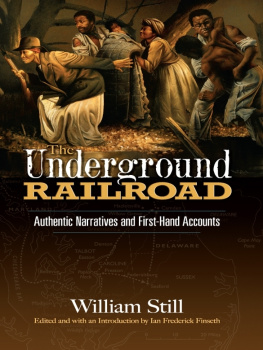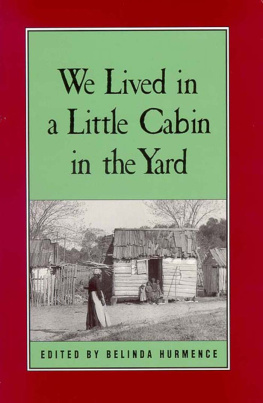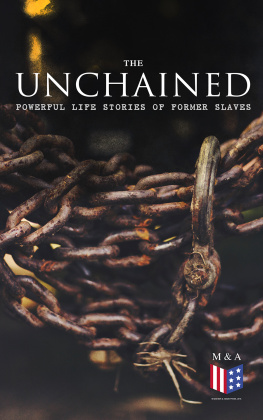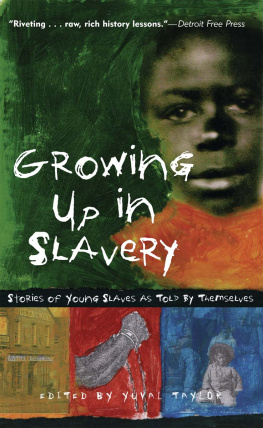FAR MORE TERRIBLE FOR WOMEN
Other Titles in the Real Voices, Real History Series
Black Indian Slave Narratives
Edited by Patrick Minges
No Mans Yoke on My Shoulders
Personal Accounts of Slavery in Florida
Edited by Horace Randall Williams
Werent No Good Times
Personal Accounts of Slavery in Alabama
Edited by Horace Randall Williams
My Folks Dont Want Me to Talk About Slavery
Personal Accounts of Slavery in North Carolina
Edited by Belinda Hurmence
Before Freedom, When I Just Can Remember
Personal Accounts of Slavery in South Carolina
Edited by Belinda Hurmence
We Lived in a Little Cabin in the Yard
Personal Accounts of Slavery in Virginia
Edited by Belinda Hurmence
Mighty Rough Times
Personal Accounts of Slavery in Tennessee
Edited by Andrea Sutcliffe
On Jordans Stormy Banks
Personal Accounts of Slavery in Georgia
Edited by Andrew Waters
Prayin to Be Set Free
Personal Accounts of Slavery in Mississippi
Edited by Andrew Waters
I Was Born in Slavery
Personal Accounts of Slavery in Texas
Edited by Andrew Waters
Cherokee Voices
Early Accounts of Cherokee Life in the East
Edited by Vicki Rozema
Voices from the Trail of Tears
Edited by Vicki Rozema
The Jamestown Adventure
Accounts of the Virginia Colony, 1605-1614
Edited by Ed Southern


Published by John F. Blair, Publisher
Copyright 2006 by Patrick Minges
All rights reserved under International and Pan American Copyright Conventions
The paper in this book meets the guidelines for permanence and durability of the Committee on Production Guidelines for Book Longevity of the Council on Library Resources.
Cover Image
Mary Reynolds, ca. 1936-1938
Courtesy of The Library of Congress, Manuscript Division
Library of Congress Cataloging-in-Publication Data
Far more terrible for women : personal accounts of women in slavery / edited by Patrick Minges.
p. cm. (Real voices, real history series)
Includes bibliographical references.
ISBN-13: 978-0-89587-323-1 (alk. paper)
ISBN-10: 0-89587-323-0
1. Women slavesSouthern StatesInterviews. 2. African American womenSouthern StatesInterviews. 3. Women slavesSouthern StatesSocial conditions19th centuryAnecdotes. 4. SlavesSouthern StatesSocial conditions19th centuryAnecdotes. 5. SlaverySouthern StatesHistory19th centuryAnecdotes. 6. Plantation lifeSouthern StatesHistory19th centuryAnecdotes. 7. Southern StatesRace relationsHistory19th centuryAnecdotes. 8. InterviewsSouthern States. I. Minges, Patrick N. (Patrick 19th centuryAnecdotes. 8. InterviewsSouthern States. I. Minges, Patrick N. (Patrick Neal), 1954
E444.F25 2006
306.3620820975dc22
[B]
2006019885
Design by Debra Long Hampton Composition by John Tarleton
To Marion Szulkowski Payler, whose courage and strength of character reflect the women of this work
Contents
When they told me my new-born babe was a girl, my heart was heavier than it had ever been before. Slavery is terrible for men; but it is far more terrible for women. Superadded to the burden common to all, they have wrongs, and sufferings, and mortifications peculiarly their own.
What do we know about the life of women under the peculiar institution of slavery as it was practiced in the United States in the nineteenth century?
Much of what we know comes from popular culture in the form of novels such as Toni Morrisons Beloved, Margaret Walkers Jubilee, Sherley Anne Williamss Dessa Rose, and Octavia Butlers Kindred and movies such as Jonathan Demmes Beloved, John Kortys Autobiography of Miss Jane Pittman, Julie Dashs Daughters of the Dust, and Haile Germinas Sankofa. Some may even know of slave life from the fictional portrayals of another era, such as Gone With the Wind and Birth of a Nation, which render shallow pastels of the rich and complex lives of women under the institution of slavery. We have come to understand this generation of women through the words of others, some sympathetic and others inclined to distort and discriminate.
Seldom, though, do we come to know of their struggle for dignity from the words of the women themselves. Some of the best resources for understanding the women who persevered the barbarity and dehumanization of slavery are the slave narratives of the nineteenth century and the ex-slave accounts found in the WPA narratives. As historian Deborah Gray White notes in her groundbreaking work, Arnt I a Woman: Female Slaves in the Plantation South, the narratives are the richest, indeed almost the only black female source dealing with female slavery.
The history of womens slave narratives parallels the history of slavery, if not the history of the United States itself. Perhaps the earliest womans slaves narrative comes from Isaiah Thomass Eccentric Biography: or, Memoirs of Remarkable Female Characters, published in 1804. On Some writers have posited that Belindas petition was transcribed and published by poet Phyllis Wheatley or abolitionist Prince Hall, thus establishing a precedent that would become a characteristic of slave narratives in the nineteenth century.
It was in the nineteenth centuryspecifically, the period between 1830 and 1860, when the country was torn by sectional strife and the struggle over slaverythat the greatest number of womens slave narratives were published. Some became classics of the genre. Beginning with the History of Mary Prince, published in London in 1831, the slave narrative became an important part of the abolitionist struggle by highlighting the plight of captured Africans in their own words; Mary Princes story was supplied at trade price to Anti-Slavery Associations.
In 1853, a slave from North Carolina by the name of Harriet Jacobs began to publish her story in a different manner by sending several anonymous letters to the New York Tribune. With the support of antislavery activists, a collection of her stories was
He tried his utmost to corrupt the pure principles my grandmother had instilled. He peopled my young mind with unclean images, such as only a vile monster could think of. I turned from him with disgust and hatred. But he was my master. I was compelled to live under the same roof with himwhere I saw a man forty years my senior daily violating the most sacred commandments of nature. He told me I was his property; that I must be subject to his will in all things. My soul revolted against the mean tyranny. But where could I turn for protection? No matter whether the slave girl be as black as ebony or as fair as her mistress. In either case, there is no shadow of law to protect her from insult, from violence, or even from death; all these are inflicted by fiends who bear the shape of men. The mistress, who ought to protect the helpless victim, has no other feelings towards her but those of jealousy and rage. The degradation, the wrongs, the vices, that grow out of slavery, are more than I can describe. They are greater than you would willingly believe.
With remarkable poignancy and prescience, she further articulates the troubled relationships between Southern sisters who shared the same gender yet lived across an unfathomable racial divide:
Next page
